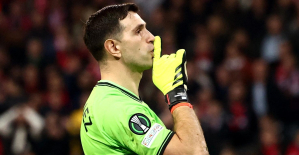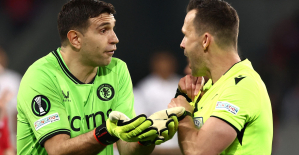filled Infinitely wide, infinitely deep and inexhaustible with edible fish. So people were a long time in the sea and also the great lakes and rivers. But in the sea, there are now significantly fewer fish than there should be, in many inland waters. The only thing that seems to be currently in the sea, is the plastic waste. To create the power of the marine life in a variety of Ways, and in part also by those who fish the sea empty. For this purpose, the power waste of the fish trawlers but also broken fishing lines and other paraphernalia of free-time fishermen dispose of both oceans as well as inland waters. And even if it sounds strange: These anglers have also a noticeable share of Overfishing.
Berlin waters ecologist calls for reform
In the national and international rules for the protection of fish stocks, recreational fisheries, however, plays hardly a role. A group of fisheries researchers, sociologists, Economists, and Ecologists from Europe and North America, led by Robert Arlinghaus from the Berlin Leibniz-Institute of freshwater ecology and inland fisheries, has now drawn up a catalogue of possible reforms. Their core claim: A sustainability-conscious fisheries policy is in need of "leisure weights, fishing as well as commercial fishing."
Precise Figures are difficult to collect, but there is no doubt that recreational fishing is both economically as well as socially and environmentally in many places an immense importance. Be financed according to the arling house in Germany, around 52 000 jobs a whole or to large Parts of the anglers – from Jobs on fishing boats on bait and equipment manufacturing to the owners and employees of fishing shops. And for four million people, five percent of the population, fishing is an important leisure activity. Elsewhere, it contributes significantly to the protein supply of the population. And, although globally, eight times more fish from commercial fishermen than anglers to the waters taken, the ratio in some places, Vice versa. And ecologically critical species are often particularly affected. In addition, it besides anglers, especially on large specimens, which are also ecologically of great importance, (see daily mirror of 15. May 2018).
Rare in the network, but often on the hook
15 years ago, the marine ecologist Felicia Coleman had pointed out, along with colleagues in the journal "Science" on it, that, for example, in the Gulf of Mexico, the popular "Red Snapper" rather rare on the net, and very often the hook pulled from the water. In inland waters in Germany, which remove most of the biomass anglers long distance. And also in the North sea and the Baltic sea, the majority of the cod landed, for example, not in nets, but on the Deck of the fishing boat.
In their study, arlinghaus and his colleagues draw a complex picture of the interactions between anglers and the used waters. Thus, Overfishing is possible, but also other types of disorders and changes in the Ecosystems. The mere fact that a disproportionately high number of large predatory fish were pulled from the water, were natural influences equilibria. And also effects on the fishermen and the perceived value of your recreational activity there is. So good fishing spots are increasingly a scarce and contested resource.
anglers can enthusiastic and organized environmentalist
On the other hand, it is known that well-informed and organized anglers can also be good environmentalists. Here in Germany, where most of them are organized in Clubs and associations – and what you do is regulated – an example for other countries. However, the common Universal rules about a minimum length, and maximum number of fish that may be taken per Angler are not, is often useful.
The researchers call, therefore, the "variable management approaches". The interests of commercial fisheries and recreational fisheries should be included equivalent to and the ecological conditions, depending on the waters to be adjusted. Here is unpopular management strategies", such as temporary access restrictions to waters, however, occasionally "necessary. to be able to
but, depending on the local needs of farming, on the one hand, "a certain degree of decision-making sovereignty" on the part of the Angler is necessary. Important is, however, also the section for such water - or water-specific approach to collect the necessary data. Here arlinghaus and his colleagues call the Angler to document about Apps, what they caught. The scepticism was partly large, anglers were monitored and fought frequently against such approaches. But "without a modern Monitoring, the costs of efficiently organized data from hundreds of thousands of people, can be built neither to resolve conflicts nor a goal-oriented management", the researchers write, in a communication of the Berlin Institute.
More aboutaquatic ecology the big fish Let's swim
Richard FriebeOverall, it was time to take anglers only more responsibility, but to integrate their claims and "fishing goals" in the management of water. "Natural uses" and, therefore, also of professional fishing, you would have to be equal.

 Sydney: Assyrian bishop stabbed, conservative TikToker outspoken on Islam
Sydney: Assyrian bishop stabbed, conservative TikToker outspoken on Islam Torrential rains in Dubai: “The event is so intense that we cannot find analogues in our databases”
Torrential rains in Dubai: “The event is so intense that we cannot find analogues in our databases” Rishi Sunak wants a tobacco-free UK
Rishi Sunak wants a tobacco-free UK In Africa, the number of millionaires will boom over the next ten years
In Africa, the number of millionaires will boom over the next ten years WHO concerned about spread of H5N1 avian flu to new species, including humans
WHO concerned about spread of H5N1 avian flu to new species, including humans New generation mosquito nets prove much more effective against malaria
New generation mosquito nets prove much more effective against malaria Covid-19: everything you need to know about the new vaccination campaign which is starting
Covid-19: everything you need to know about the new vaccination campaign which is starting The best laptops of the moment boast artificial intelligence
The best laptops of the moment boast artificial intelligence Bitcoin halving: what will the planned reduction in emissions from the queen of cryptos change?
Bitcoin halving: what will the planned reduction in emissions from the queen of cryptos change? The Flink home shopping delivery platform will be liquidated in France
The Flink home shopping delivery platform will be liquidated in France Bercy threatens to veto the sale of Biogaran (Servier) to an Indian industrialist
Bercy threatens to veto the sale of Biogaran (Servier) to an Indian industrialist Switch or signaling breakdown, operating incident or catenaries... Do you speak the language of RATP and SNCF?
Switch or signaling breakdown, operating incident or catenaries... Do you speak the language of RATP and SNCF? The main facade of the old Copenhagen Stock Exchange collapsed, two days after the fire started
The main facade of the old Copenhagen Stock Exchange collapsed, two days after the fire started Alain Delon decorated by Ukraine for his support in the conflict against Russia
Alain Delon decorated by Ukraine for his support in the conflict against Russia Who’s Who launches the first edition of its literary prize
Who’s Who launches the first edition of its literary prize Sylvain Amic appointed to the Musée d’Orsay to replace Christophe Leribault
Sylvain Amic appointed to the Musée d’Orsay to replace Christophe Leribault Skoda Kodiaq 2024: a 'beast' plug-in hybrid SUV
Skoda Kodiaq 2024: a 'beast' plug-in hybrid SUV Tesla launches a new Model Y with 600 km of autonomy at a "more accessible price"
Tesla launches a new Model Y with 600 km of autonomy at a "more accessible price" The 10 best-selling cars in March 2024 in Spain: sales fall due to Easter
The 10 best-selling cars in March 2024 in Spain: sales fall due to Easter A private jet company buys more than 100 flying cars
A private jet company buys more than 100 flying cars This is how housing prices have changed in Spain in the last decade
This is how housing prices have changed in Spain in the last decade The home mortgage firm drops 10% in January and interest soars to 3.46%
The home mortgage firm drops 10% in January and interest soars to 3.46% The jewel of the Rocío de Nagüeles urbanization: a dream villa in Marbella
The jewel of the Rocío de Nagüeles urbanization: a dream villa in Marbella Rental prices grow by 7.3% in February: where does it go up and where does it go down?
Rental prices grow by 7.3% in February: where does it go up and where does it go down? With the promise of a “real burst of authority”, Gabriel Attal provokes the ire of the opposition
With the promise of a “real burst of authority”, Gabriel Attal provokes the ire of the opposition Europeans: the schedule of debates to follow between now and June 9
Europeans: the schedule of debates to follow between now and June 9 Europeans: “In France, there is a left and there is a right,” assures Bellamy
Europeans: “In France, there is a left and there is a right,” assures Bellamy During the night of the economy, the right points out the budgetary flaws of the macronie
During the night of the economy, the right points out the budgetary flaws of the macronie These French cities that will boycott the World Cup in Qatar
These French cities that will boycott the World Cup in Qatar Europa Conference League: the semi-final flies to Lille, which loses to the wire against Aston Villa
Europa Conference League: the semi-final flies to Lille, which loses to the wire against Aston Villa Lille-Aston Villa: Cash disgusts Lille, the arbitration too... The tops and the flops
Lille-Aston Villa: Cash disgusts Lille, the arbitration too... The tops and the flops Handball: Les Bleues in the same group as Spain at Euro 2024
Handball: Les Bleues in the same group as Spain at Euro 2024 Europa Conference League: for Létang, Martinez “does not have the attitude of a high-level athlete”
Europa Conference League: for Létang, Martinez “does not have the attitude of a high-level athlete”


















